The History Of India !!
Indian history is a vast and complex subject that spans over thousands of years. It is a story of kings and empires, of invasions and conquests, of religious and cultural movements, and of social and economic transformations. In this long script, we will attempt to give an overview of Indian history, highlighting some of its key events, personalities, and themes.
Prehistoric India (Before 3300 BCE)
The earliest known civilization in India is the Indus Valley Civilization, which existed from about 3300 BCE to 1300 BCE. This civilization developed in the northwestern region of the Indian subcontinent, in what is now Pakistan and western India. The Indus Valley Civilization was characterized by well-planned cities, sophisticated plumbing systems, and a script that has not yet been deciphered.
Ancient India (3300 BCE - 1200 CE)
The ancient period in Indian history is marked by the emergence of powerful empires and the spread of religious and philosophical ideas. The Vedic period (1500 BCE - 500 BCE) saw the development of the Vedas, the oldest sacred texts of Hinduism. The Mauryan Empire (321 BCE - 185 BCE), under the leadership of Emperor Ashoka, united much of the Indian subcontinent and spread Buddhist ideas throughout the region. The Gupta Empire (320 CE - 550 CE) is considered a golden age of Indian civilization, with significant achievements in science, mathematics, and the arts.
Medieval India (1200 CE - 1700 CE)
The medieval period in Indian history was marked by the arrival of Islam and the spread of Islamic culture and traditions. The Delhi Sultanate (1206 CE - 1526 CE) was a series of Muslim dynasties that ruled over northern India. The Mughal Empire (1526 CE - 1857 CE) was founded by Babur, a Central Asian ruler who conquered much of northern India. The Mughals were known for their grand architecture, including the Taj Mahal, and for their patronage of the arts.
Colonial India (1700 CE - 1947 CE)
The colonial period in Indian history began with the arrival of European traders and the establishment of the British East India Company in the early 17th century. Over time, the British gained more control over India, eventually making it a colony in 1858. India played a significant role in the British Empire, providing raw materials and labor for British factories and serving as a market for British goods. Indian nationalism grew during this time, as Indians sought to gain greater control over their own affairs.
Independence and Partition (1947 CE - present)
India gained independence from British rule in 1947, but the process was marked by violence and division. India was divided into two countries, India and Pakistan, with the Muslim-majority regions becoming Pakistan. The partition led to widespread violence, as millions of people were forced to migrate across the new borders. India became a democratic republic in 1950, and has since made significant progress in economic and social development. However, India continues to face challenges, including poverty, corruption, and religious and ethnic tensions.
Throughout its history, India has been marked by diversity and complexity, with different regions, religions, and cultures coexisting and interacting with each other. Indian history has been shaped by the rise and fall of empires, the spread of religions and ideas, and the struggles of people to gain control over their own destinies. Despite the challenges it has faced, India has maintained a rich and vibrant culture, and continues to be a dynamic force in the world today.
#history of india,#indianhistory,#ancientindia, #history of the #indians,history of ancient india,the history of india,who was the first king of india,when was india founded,chandragupta maurya,maurya,ashoka the great,who was the greatest king of india?,what is the history of india,ancient indian kingdoms,indian documentary,indians under the british,colonization of india,medieval indian kingdoms,muslim india,how did india become independent,india
-
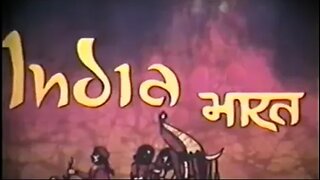 27:41
27:41
16mm Educational Films
4 months agoThe History of India: Geography, Culture & Religions
12 -
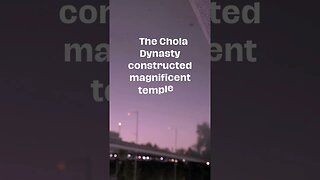 0:06
0:06
vivek1811
10 months agoIndian History Facts : 24
29 -
 17:53
17:53
Mazaj
9 months agoIndia making history
22 -
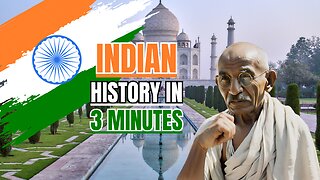 3:02
3:02
World History TV
5 months agoIndian History in 3 Minutes
64 -
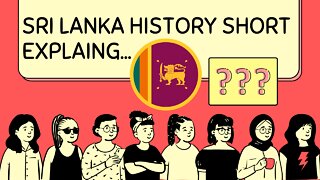 1:12
1:12
sl amila tech
1 year agoSri Lanka history short explaing
14 -
 0:35
0:35
Deepjk
9 months agoFinally, India created history,,,,,,,
1 -
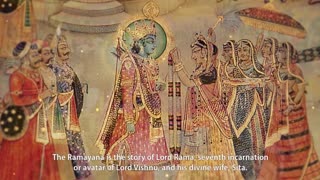 23:01
23:01
Buisnessmorg
1 year agoHistory of religious hindu india
-
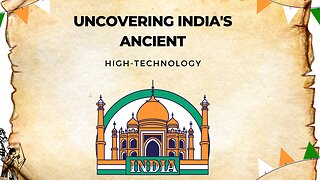 14:26
14:26
Exploring the future of technology
11 months agoUncovering India's Ancient "High-Technology"
10 -
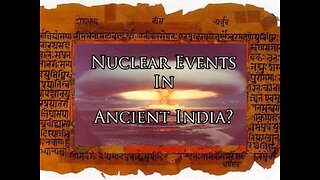 3:21
3:21
Free time for you
1 year agoNuclear Events in Ancient India
42 -
 0:55
0:55
FGP
9 months ago🌍 Unveiled India History: Partition, Religion, And Identity 🕊️🤝
44